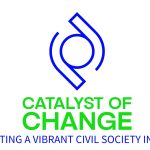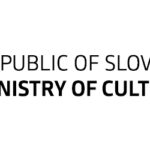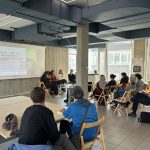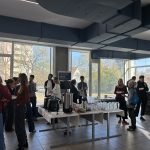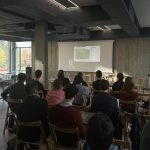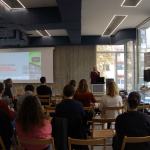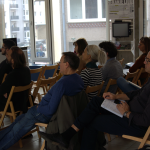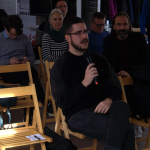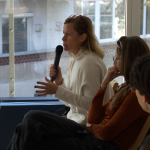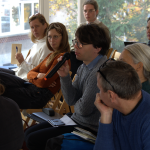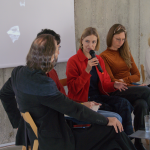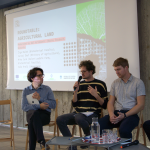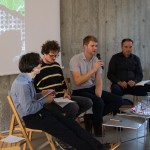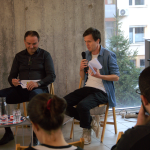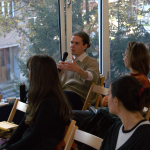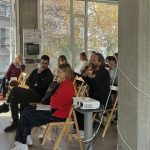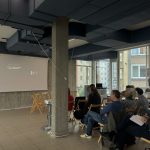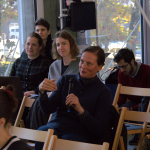International seminar: Land Politics
November 6, 2025
Ljubljana
How does land – from urban plots to agricultural fields – shape social relations, inequalities, and the future of communities?
These were the guiding questions of the international seminar Land Politics that brought together researchers, civil society representatives, and practitioners from Slovenia, Croatia, and Italy to explore how land functions as a political space that reveals deep connections between governance, ecology, and justice.
The discussions connected perspectives from urban and rural contexts, highlighting how speculation, privatization, and over-exploitation of land deepen inequalities and undermine collective well-being.
Keynote lectures from international guests
Maria Kaika and Katarina Kušić joined us via Zoom to shed light on global trends in land access policy in their lectures.
The seminar opened with a keynote by Maria Kaika (University of Amsterdam) titled Class Meets Land. Drawing on her research with Luca Ruggiero, Kaika traced 150 years of Milan’s industrial and financial history through the story of the transformation of the Pirelli Bicocca estate. Her research shows how financialization is not only a story of global elites but also of local struggles embodied in the changing meaning of industrial land workers’ lives.
In the second keynote Land Politics, Katarina Kušić (University of Vienna) offered a comprehensive look at rural land use and ownership in Southeast Europe, examining the complex relationships between people, land, and environment in the region. Kušić traced the historical evolution of cooperative and private ownership, the consequences of post-Yugoslav privatization, and emphasized the need for approaches linking nature conservation and social justice.
Land in Urban Areas: participation and social ownership
The first roundtable, Land in Urban Areas, moderated by Marko Peterlin (IPoP – Institute for Spatial Policies), featured Riccardo Laterza (Adesso Trieste – Pact for the City), Filip Pračić (Pravo na grad, Zagreb), Zala Velkavrh (Prostorož), Nika Grabar (Faculty of Architecture), and Gaja Mežnarić Osole (Trajna).
The discussion examined how urban land-use decisions reflect broader governance models – from citizen committees in Trieste to participatory budgeting in Zagreb and Ljubljana’s complex ownership structures. Speakers highlighted the limits of current participatory planning tools and the need for new collective governance models that empower communities.
Agricultural Land: a balance of environmental, economic and social goals
The closing roundtable Agricultural Land, moderated by Gal Krizmanič (Radio Študent, Dnevnik), featured Žiga Malek (Biotechnical Faculty), Jernej Škof (Ministry of Agriculture), Miha Curk (Zeleni pašnik Farm, Biotechnical Faculty), and Saša Kralj (Umanotera).
Speakers discussed how the EU’s Common Agricultural Policy (CAP) shapes ownership concentration, access to subsidies, and land management practices in Europe. They shared experiences from Slovenia and beyond on regenerative agriculture, biodiversity protection, and emission reduction, stressing the need for clearer environmental policies and stronger demand for sustainable food in public institutions.
Land as a political question
As part of the GreenPaths project, our recent case study examined how the EU’s Common Agricultural Policy (CAP) influences land use, ownership, and agrarian livelihoods in Slovenia, Croatia, and Serbia. The study whos how CAP mechanisms interact with post-socialist restitution and liberalisation processes, accelerating land concentration, marginalising smallholders, and deepening rural inequalities.
The seminar built on these insights, reaffirming that rethinking land politics and governance are vital to a just green transition – one that ensures fairer access to land, strengthens social ownership, and connects environmental goals with social equity.
Thank you to all participants, speakers, and attendees who contributed to the discussion!
Organisation and Support
This event was organised by Policy Lab and is part of projects Preparing CSOs for the Struggles Ahead and Making Land Justice Visible: Strengthening Civil Society Voices, supported by the Netherlands Helsinki Committee, and Political school of degrowth for culture workers, a Ministry of Culture RS project, and the GreenPaths project.
———————–
“Funded by the European Union. Views and opinions expressed are however those of the author(s) only and do not necessarily reflect those of the European Union or the Netherlands Helsinki Committee. Neither the European Union nor the NHC can be held responsible for them.”
#EUfunded #NHC #CatalystofChange #EUValues




